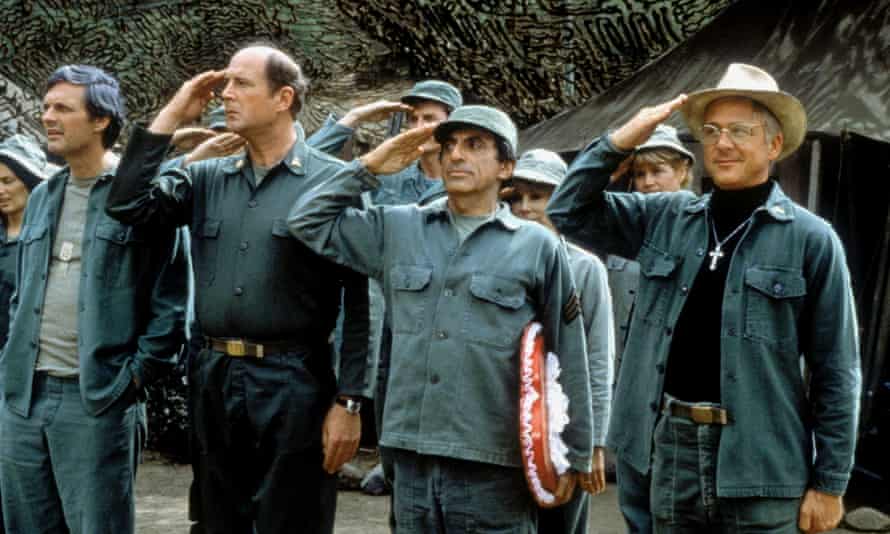David Ogden Stiers Reading the Messiah in Epcot December 1999
There are some actors who take one role against which a whole career is measured. The touchstone role for David Ogden Stiers, who has died of cancer aged 75, was Major Charles Emerson Winchester 3 in the superior TV series 1000*A*Southward*H, from 1977 to 1983.
Winchester joined the team of doctors at the mobile regular army surgical hospital stationed in South korea at the tiptop of the Korean war, replacing the crass and inept Frank Burns. In dissimilarity, the Harvard-educated Winchester was a highly skilled surgeon, extremely well read and a great lover of classical music. In these and other aspects Winchester resembled Stiers in real life, and his graphic symbol brought a certain gravitas to M*A*South*H. In fact, Winchester was probably the about cultured and articulate character that e'er graced an American TV sitcom, if M*A*Southward*H tin be so chosen.
The show had a limited laugh rails and was non agape to motion from comedy to drama. The tall and balding Stiers created a rounded, conceivable figure in Winchester, the nemesis of his fellow surgeons Hawkeye (Alan Alda) and BJ Hunnicutt (Mike Farrell), who got rid of their frustration and disgust at the state of war by playing crazy practical jokes and wisecracking.

Winchester kept his sanity by excoriating anybody and everything effectually him, and Stiers portrayed his pent-upwards frustration in one magnificent outburst. "Know this," he said. "You lot can cut me off from the civilised globe, y'all tin can incarcerate me with two moronic cellmates, you can torture me with your thrice-daily swill, merely you cannot break the spirit of a Winchester. My word shall exist heard from this wilderness. I shall exist delivered from this fetid and festering sewer."
In many episodes Stiers also revealed Winchester's tender side, such every bit the one in which he defends a young patient who is bullied because he stutters. Despite his pomposity he shows an overt concern for his patients' welfare.
Stiers was born the son of Margaret (nee Ogden) and Kenneth Stiers, an accountant and lumber salesman in Peoria, Illinois, just was brought upwardly and educated in Oregon. After attending the Academy of Oregon, he joined the company of the Santa Clara Shakespeare festival, where he stayed for seven years, during which time, despite his young historic period, he was able to tackle such parts every bit Richard Three and King Lear.
In 1969 he moved to New York to written report drama and singing at the Juilliard school. After a spell at the San Francisco Actors' Workshop he became a fellow member of John Houseman's touring Urban center Center Interim Visitor where, in 1973-74, he had leading roles in The Ragamuffin's Opera, Measure for Measure and The Three Sisters. From there Stiers went straight to Broadway, where he featured as an ageing alcoholic magician in the i-act hit musical The Magic Show (1974-78), using his rich baritone in several numbers.
Stiers' long career on television began in 1975 with a small part in Kojak, then as the autocratic Idiot box station boss on The Mary Tyler Moore Show (1976-77) just before M*A*S*H and fame and fortune came his fashion. He was seldom off television for the next four decades. Among the shows in which he featured were Due north and Due south (1985), Murder, She Wrote (1986), Star Expedition: The Next Generation (1991), Honey and Coin (1999-2000), and The Dead Zone (2002-07), in which he was memorable equally the enigmatic Rev Purdy.
Stiers managed to make something of the most thankless role in television drama, that of district attorney Michael Reston, who ever lost his cases in the Perry Mason serial (1986-88). Occasionally the ghost of Winchester would surface, every bit it did in a 2003 episode of Frasier in which Stiers, equally the psychologist Leland Barton, finds he has much in mutual with the main character, discussing antiques and furniture with him every bit they sip sherry together. In many ways the snobbish Winchester was really an antecedent of Frasier.
Stiers' spasmodic roles in feature films included cursory appearances in v of Woody Allen's to the lowest degree successful movies: Another Woman (1988), Shadows and Fog (1991), Mighty Aphrodite (1995), Everybody Says I Love Yous (1996) and The Curse of the Jade Scorpion (2001). Simply much of his other picture show work was heard and not seen, as he was an exemplary voice artist in a cord of animated movies, mainly for Walt Disney.
These began every bit the vox of the clock and as the narrator in Beauty and the Creature (1991), continuing with Pocahontas (1995), The Hunchback of Notre Matriarch (1996) and Teacher's Pet (2004). On tv set he also did voices on House of Mouse (2001-02) and as the villain Jumba Jookiba in Lilo and Sew (2003-06), demonstrating an extraordinary range of accents and timbre.
Another branch of his talents was every bit resident usher of the Newport Symphony Orchestra in Newport, Oregon.
In 2009 he chose to come up out as gay, proverb: "I wish to spend my life's twilight being just who I am."
Source: https://www.theguardian.com/tv-and-radio/2018/mar/11/david-ogden-stiers-obituary
0 Response to "David Ogden Stiers Reading the Messiah in Epcot December 1999"
Post a Comment